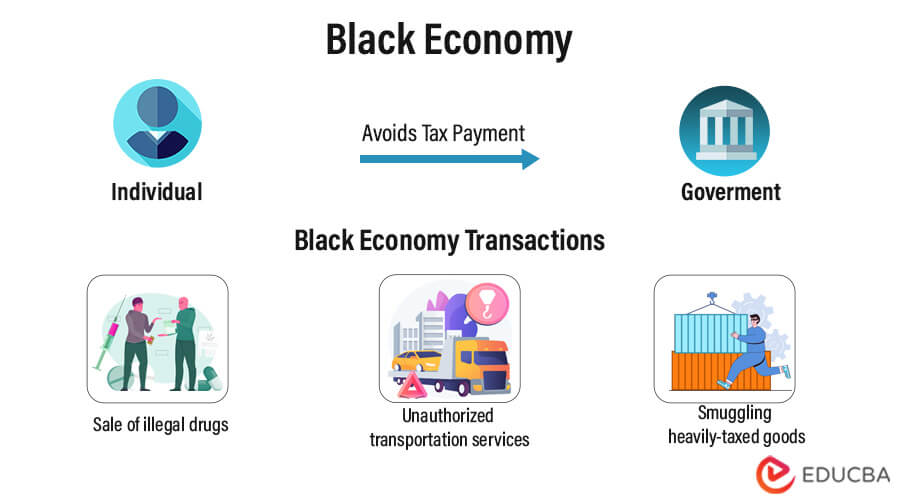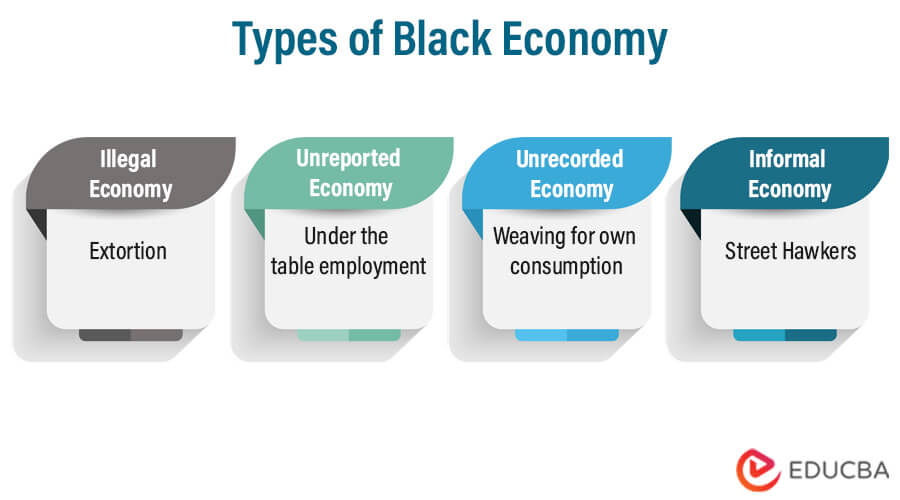What is the Black Economy?
The black economy is part of a country’s economy that defies the jurisdiction imposed by the State. Suppose, after a catastrophic event, a supermarket can sell rice only for a specific price. Suppliers offer rice at increased costs when the business runs low on supplies. Therefore, the secondhand market is a black market.
A black economy involves commodities and services that may or may not be legal, although most are illegal. However, one certainty remains: the transactions within this economy are illegal due to the lack of documentation. The black economy operates in parallel with the legal market, primarily to evade government price controls and taxes. It is commonly called the underground or shadow economy, representing a collection of unauthorized markets within an economy.
Key Highlights
- The black economy encompasses business activities that violate societal rules and regulations
- It actively engages in unlawful activities, retains its tax-exempt status, and receives minimal inclusion in formal economic data. It may be something other than traditional market research transactions, making estimation very challenging
- Black market transactions can significantly impact the economy of a state or country, regardless of the size of the economy
- By obtaining necessary goods and services at lower prices, the black economy helps some slum residents and downtrodden sections of society.
Explanation
- Black Economy violates the government’s regulations applied to certain goods and services, which either marks them as illegal to produce or puts them on a higher bracket of taxes
- Other than that, the secondary reason for the existence of the black economy is the existence of certain occupations that are not official yet contribute to a nation’s output
- Some famous examples of the Black Economy are the existence of the famous darknet website Silk Road in 2011-13 and India’s black economy valued at around 79% of the country’s GDP in 2009-11
- It operates in a state-like jurisdiction but does not adhere to the rules for conducting business there
- It strongly harms the market of certain goods and services available in the real economy due to their availability at a lower price in the underground. Not only that, it plays an instrumental role in boosting crime rates. However, it also plays an important role in giving a safe route to subsistence since it also provides simple and not illegal jobs for those who perished in the system or are staying off on welfare.
How Does it Work?
- The primary reason for the rise of the black economy is the government’s requirements and restrictions on a variety of goods/services
- Citizens can engage in these economic activities to evade higher taxes, acquire prohibited or expensive products, etc
- In this economy, participants engage in both legal and illegal acts. For example, employers are allowed to pay wages in cash, but deliberately failing to record those transactions to evade taxes is considered unlawful. Conversely, engaging in the trading of weapons is strictly illegal.
- However, black markets prove their strength by compensating for the scarcity of resources caused by failed or corrupt government policies. For example, banned or overpriced products can be readily available in these markets
- Participants use cash to make transactions since money does not need financial recording. Moreover, privatized forms of tokens other than money, such as cryptocurrency, have opened new possibilities to carry illegal transactions.
Example of Black Economy
- Purchasing forged and false documentation like identification, educational, and occupational certificates is one of the common examples
- Unauthorized employment of labor like child labor and undocumented immigrants can be another activity that falls under this economy
- Certain products are illegal in some parts of the world and legal in others. Therefore, purchasing those goods/services can be felonious
- A thriving underground business in the firearms industry boosts the crime rate in the country.
Types of Black Economy
- The Illegal Economy: The illegal economy produces income from illegal activities in the black market that violate the legislation of a nation, such as running a drug cartel, retailing banned firearms, etc
- The Unreported economy: The amount of money recorded in an undocumented economy is either unreliable or nonexistent. Money laundering and tax evasion are a few examples. The primary purpose of this economy is to evade tax regulations over the legality of the concerned commodity or service
- The Unrecorded Economy: Unrecorded economy takes place when the provision of certain goods and services isn’t mentioned in the institutional records by the accountable authorities. Examples include doing household chores, tailoring, sewage cleaning, etc
- The Informal Economy: This economy involves those evaded from the benefits and rights given by the legislative framework of the State. A helper who works for the owner of a local grocery store is considered to be working in the informal sector. This is because he has yet to be assigned a permanent contract that ensures minimum wage and some other non-monetary allowances available in the Human Resource policy of companies operating under the formal sector.
Impact of the Black Economy
- The impact of the Black economy involves evading the income away from the real economy
- This situation actively fosters increased participation in significantly more profound criminal activities through the black market, including extortion, smuggling, tax evasion, human trafficking, and more.
- When the corrupted nature of the ruling government leads to inflation in general commodities, the black economy indulges in availing those necessities for the general public
- Entities engaged in illegal economic activities actively circumvent, evade, or face exclusion from the institutional framework of laws, rights, and enforcement sanctions that govern legitimate trade and production.
- As revenues decline, people still working in the legitimate economy might be subject to heavier tax obligations, increasing their motivation to enter the underworld.
Pros of the Black Economy
- The black economy, in a way, gives hope to those people who would be otherwise perished in homelessness or seek welfare from the government
- The jobs available for people in the lowest economic hierarchy may not necessarily be harmful or offensive, such as fixing cables and electric connections.
Conclusion
The Black Economy poses a threat to the legitimacy of a State, potentially exposing the political systems for better governance in the future or endangering the nation’s safety. A primary solution to address the dominance of the Black Economy in certain nations today is to legitimize and recognize as many legal yet unrecorded occupations actively. This approach seeks to actively improve the fundamental labor rights of individuals currently experiencing disregard, despite the existing opportunities within the underground economy.
Frequently Asked Questions(FAQs)
Q1. What is a black economy?
Answer: A black economy incorporates irregular activities and unlawful transactions that violate the legal norms of a nation. An example is selling banned goods at the market. In addition, considering that the action is permitted, like purchasing groceries, but the payment occurs in cash, and the shopkeeper does not make a bill to save taxes. Therefore it becomes an illicit transaction.
Q2. What kind of goods and services comes under the black market?
Answer: All the illegal ones, as well as those unregistered in contributing towards the nation’s economic output, also known as the Gross Domestic Product, are included in the black market.
Q3. What are the different types of Black Economy?
Answer: The four types are the unrecorded economy, the unreported economy, the illegal economy, and the informal economy.
Q4. How does the black economy impact different institutions?
Answer: The black economy exposes the real economy market by providing cheaper goods and services. The allowance of illegal activities profoundly increases the crime rate in the country. However, those who can’t find a job in the formal employment sector often find themselves doing petty jobs like home cleaning service, plumbing, etc., which come under the same solely due to their lack of a real economy.
Recommended Articles
This article explains the black economy. We discuss its meaning, types, benefits, and more. To learn more, visit the following articles,




